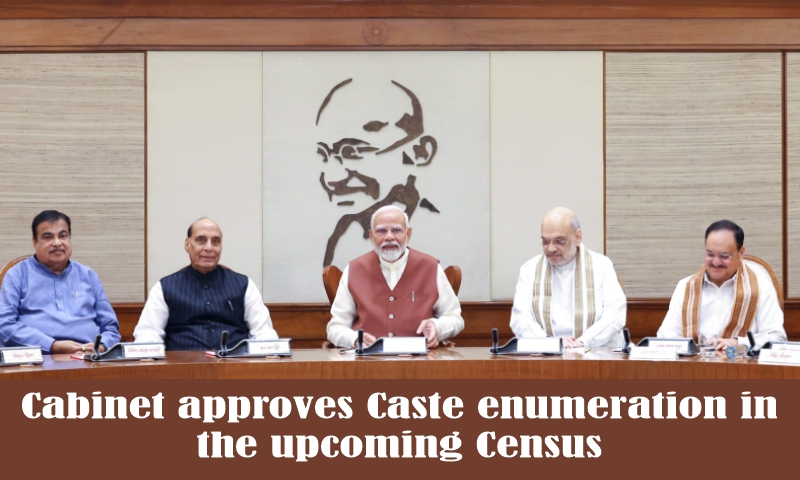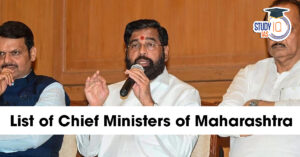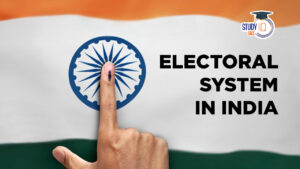Table of Contents
The Union Cabinet has approved the addition of caste enumeration in the next national census, as Union Minister Ashwini Vaishnaw declared on April 30, 2025. The Cabinet Committee on Political Affairs (CCPA), led by Prime Minister Narendra Modi, took this decision, which is a big change since caste data, excluding Scheduled Castes (SCs) and Scheduled Tribes (STs), have not been gathered in the census since independence, with the last detailed caste-based census held in 1931.
Cabinet Approves Caste Enumeration in the Upcoming Census
Prime Minister Shri Narendra Modi-headed Cabinet Committee on Political Affairs has made a decision to incorporate Caste Enumeration in the Upcoming Census. This proves that the current government stands for the comprehensive interests and principles of the country and society.
Though the Cabinet approves Caste Enumeration in the Upcoming Census of India, the modalities and timeline for its conduct are still to be spelt out. This move resurrects an old controversy with profound implications for India’s governance, policy, and social dynamics.
Key Highlights of Caste Enumeration in Next Census
Rationale by the Government
The government conveyed its intention for the sake of the total interest of the nation and society as a whole and reiterated that undertaking caste enumeration along with the Census will keep the process open and credible to forestall socially harmful, non-transparency-marked surveys of dubious political intention in some of the states.
Historical Background
Minister Vaishnaw had criticised the Congress party, accusing them of being opposed to a caste census in the past and politicising the issue, observing that although the Congress-led UPA government carried out the Socio-Economic and Caste Census (SECC) in 2011, the caste data was not released.
Stance of Opposition Parties
The move is made at a time when the opposition, and more specifically the Congress party and its leader Rahul Gandhi, have been vocally pushing for a countrywide caste census to ensure fair representation and targeted welfare measures.
Bihar’s Caste Survey
The news also comes just ahead of the Bihar assembly polls, where caste dynamics are a vital political consideration. Bihar itself has recently carried out its caste survey in 2023. Check the Bihar Caste Census Report in detail here!
Constitutional Ground
The government pointed out that the census is a Union subject as per Article 246 of the Constitution.
Advantages of Caste-Based Census
The argument goes that conducting a caste census will give true figures about the socio-economic status of different castes and allow the government to create effective and specialised welfare policies, ensure equitable distribution of resources, assess affirmative action policies, and have an overarching idea about India’s social fabric.
Concerns and Criticisms
In the past, there have been fears that a caste census would reinforce social divisions, make caste identities stronger, and generate greater demands for reservations.
Also Read: Caste Census in India
About Census
According to Article 246 of the Indian Constitution, the Census is a Union subject enumerated at 69 in the Union List in the Seventh Schedule. While certain states have carried out surveys to count castes, such surveys have differed in transparency and purpose, some being purely from a political standpoint, raising doubts in society.
Given all these conditions, and to protect our social fabric from political pressure, it has been decided that caste enumeration will be incorporated in the general census rather than being held as a distinct survey.
This will make society economically and socially stronger, and the progress of the country will go on without any obstacles. It is surprising that when a provision of 10 per cent reservation was given to the economically weaker sections of society, it did not generate tension in any segment of society.
Background of Caste Census
Caste was left out of all census operations that have been carried out after independence. In 2010, then Prime Minister Late Dr. Manmohan Singh reassured the Lok Sabha that the issue of caste census would be tabled in the Cabinet. A Group of Ministers was constituted to discuss this issue, and the majority of political parties suggested holding a caste census. Despite this, the former government decided upon a survey rather than a census by caste, the Socio-Economic and Caste Census (SECC).


 List of Chief Ministers of Maharashtra F...
List of Chief Ministers of Maharashtra F...
 Electoral System in India 2026: SIR Upda...
Electoral System in India 2026: SIR Upda...
 SLAPP Suits: Meaning, Examples, Impact o...
SLAPP Suits: Meaning, Examples, Impact o...

























